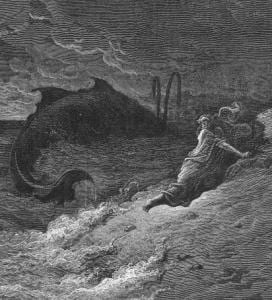 Jonah and I are old friends, or at least well-worn acquaintances. Among the very first scholarly articles I ever wrote (1981) was on Jonah, published in what was then a rather obscure European journal. So, 40 years later, here he comes again in the Common Lectionary, ready to offer his hilarious and important lessons for us afresh. As I have said before in these essays, one simply cannot preach from one chapter of this tiny book; you must know the whole thing, but since it is only 42 verses long that should not be much of a problem. The book of Jonah itself is a narrative sermon, using a sparkling tale of magic and wonder to make significant comments on the nature of God and on the danger of prophets run amok. For that surely is what Jonah is: literally a prophet on the run from the call of YHWH, yet doomed to success as prophet despite his obvious desire to fail. In short, Jonah is a prophet gone very bad.
Jonah and I are old friends, or at least well-worn acquaintances. Among the very first scholarly articles I ever wrote (1981) was on Jonah, published in what was then a rather obscure European journal. So, 40 years later, here he comes again in the Common Lectionary, ready to offer his hilarious and important lessons for us afresh. As I have said before in these essays, one simply cannot preach from one chapter of this tiny book; you must know the whole thing, but since it is only 42 verses long that should not be much of a problem. The book of Jonah itself is a narrative sermon, using a sparkling tale of magic and wonder to make significant comments on the nature of God and on the danger of prophets run amok. For that surely is what Jonah is: literally a prophet on the run from the call of YHWH, yet doomed to success as prophet despite his obvious desire to fail. In short, Jonah is a prophet gone very bad.
Jonah (“dove” in Hebrew) is called by YHWH to go to Nineveh, capital of the empire of Assyria, a nation that from 900-612 BCE or so was the scourge of the Near East, a byword for evil practices and hegemonic designs on all other nations. They destroyed the northern kingdom of Israel in 722BCE and moved south to obliterate Judah, but were stopped by a crisis in their homeland. Huge plaques from the walls of the palace of Assurbanipal, many now lodged in the British Museum in London, depict Assyrian warriors rampaging with exquisite cruelties through multiple nations and peoples, exerting their dominant will on everyone they encountered. To be sent to Nineveh to preach about YHWH was like being sent to the Kremlin to confront Putin or to Beijing to speak against Xi; it is hardly a plum assignment!
So, not surprisingly, Jonah heads west instead of east to Assyria, hoping to avoid the task and in the end escape YHWH altogether. But YHWH has other plans for this prophet, for that is what he is: prophet, called, equipped, and sent. On the ship of his desired escape, YHWH calls Jonah again through the mouth of the ship’s captain, attempting survival in the midst of a supernatural storm. But after the sailors of the vessel cast dice to see why this obviously miraculous tempest is trying to swamp the ship, and who is the storm’s cause, the dice fall on Jonah as the culprit. They ask the prophet a series of rapid fire questions about who and what he is and where comes from and what he does for a living, and most importantly, is he the problem here, Jonah the prophet replies, most peculiarly: “A Hebrew I am, and YHWH, God of heaven, I fear, who made the sea and dry land” (Jonah 1:9). He hardly answers all their questions, but from what he does say the sailors derive the truth that it is his problem for sure; after all, they conclude, he is running away from the God who made sea and dry land, hence the currently boiling sea, the creature of this God, is acting so because the God who made it is furious at Jonah. At first, they try to save the problem Jonah, but the sea rages on, and finally they are forced to chuck him into the sea, only after a heartfelt prayer to YHWH to forgive them for this man’s actions, whereupon the sea immediately calms down. When the sailors witness that miracle, they proceed to sacrifice to YHWH and to make vows for future commitments to this powerful God. In short, Jonah has converted them to be devotees of YHWH, though that was far from his intent.

While the sailors are sacrificing and vowing, Jonah drops deeper into the sea. While there, he prays a prayer that I think continues his half-baked ideas about YHWH and his terror about doing what YHWH has called him to do. And after the prayer, the big fish, sent by YHWH to save the wretch once again, first swallows him up for three days and nights and then spits him out on the dry land. And that brings us to our text.
“The word of YHWH came to Jonah a second time. ‘Arise! Go to Nineveh, the great city, and cry to it the crying that I speak to you!’ So Jonah arose and went to Nineveh according to the word of God. Now Nineveh was a great city; even God walking (through) it is a three-day journey. Jonah began to enter the city, walking one day. He cried out and said, ‘In forty days, Nineveh will be overthrown’ (Jonah 3:1-4)! (My translation) Jonah most reluctantly goes to Nineveh, realizing that he cannot escape YHWH on land, on sea, or under it. Nineveh is immense; my reading suggests that even God could not walk across it in three days. NRSV reads the phrase: “Now Nineveh was an exceedingly great city, three day’s journey in breadth.” “Exceedingly” in Hebrew is literally “to God,” suggesting that even in the eyes of God Nineveh was huge. Jonah slips into the vast metropolis, going only as far as one day will bring him, stands on one street corner, and says, loudly or softly we are not told, “In forty days, Nineveh will be overthrown!” What Jonah may or may not know is that the verb he has used, along with being translated “overthrown” or “destroyed,” may also mean “transform,” but we can be certain that the author knows the ambiguity.
Astonishingly, the entire city, including all the livestock, is thrown into a panic for repentance. Even the king is seized with horror, believing the negative meaning of the five-word sermon of the reluctant prophet. He is led to tear off his royal robes, toss his crown in the dust, and proclaim that everyone and everything in the city must commence a fast and the most sincere cries to God for forgiveness and mercy. God sees all that serious religious activity and immediately changes the divine mind about destruction. All Ninevites proceed to cry out in gladness, and all the cows and goats moo and bleat their joy, too. Meanwhile, Jonah, the source of these happy conversions, heads out of Nineveh, still hoping for the destruction of the city by an angry God. In the fourth chapter it is finally revealed to the reader what has driven this man to reject God’s call, to flee from it in horror, finally to cry a pathetic five-word sermon, ridiculously “fulfilling” God’s call to cry out in Nineveh. The reason for Jonah’s actions become plain; he just hates Ninevites, saying that he knew if he ever opened his nasty mouth to say something about YHWH, people would believe him. He would rather be dead than have to worship with a passel of smelly sailors, let alone a whole crowd of filthy Ninevites! Jonah is a prophet gone very bad! The book is nothing less than a satiric assault on prophets who claim to know God, but who deep down know nothing about that God whatever. God is also the God of Ninevites and sailors, and to reject them is to reject God.
How many Jonahs can we find in 21st century US America? His number is legion, and too often includes me. I say I know and love and follow God, but regularly I trip over my own prejudices, my own bigotries, my own human limitations so much as to give the lie to my professed Godliness. When the rioters on Jan. 6 had the gall to spread a banner proclaiming “Jesus 2020,” while they were trashing the capitol and threatening our legislators, they were Jonah in the flesh. When Paula White and Robert Jeffress bleat their approbations of Donald Trump, praising his lies and bigotries and profound professed hatreds for any number of people who call him into question, they are also Jonahs. When Jerry Falwell, Jr. announces that Trump was uniquely sent by God to “bring America back to the right way,” in the face of the horrors that Trump persisted in performing, shouting “Mexican rapists” and “shithole countries” and “BLM terrorists,” he is likewise a living Jonah. Jonah unfortunately arises again and again in our history, and appears in multiple guises. He exists whenever someone says that they love God, but fail to love all that God loves. John said, “The poor you have always with you,” and in our time that may be all too painfully true, but it is just as true to say that “Jonah you have always with you.” And that is a very great tragedy indeed. Our world is chock-full of prophets gone bad. God deliver us from them, even when we are among their number.
(Images from Wikimedia Commons)












